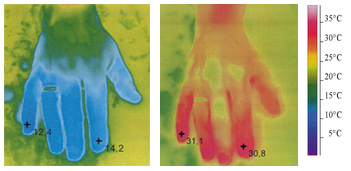AN EXTRACT from an ancient tree can potentially help sufferers of a condition as common as hayfever, but which most people don’t even know they have.
Raynaud’s Syndrome (or Raynaud’s Phenomenon) is thought to affect as many as one in six people in the UK, making it as common as arthritis or hayfever. However, many people have never heard of it and an estimated 80% of sufferers don’t even know they have it.
Thought to be caused by poor circulation to the extremities, Raynaud’s Syndrome is typically characterized by cold and painful hands and feet, even at relatively mild temperatures.
Cold weather can trigger an attack of Raynaud’s as can emotional changes, stress or hormone changes. In an attack, hands and feet can remain cold for some time, can change colour and feel numb, tingly or painful.
Celebrities who suffer from the condition include BBC Breakfast presenter Louise Minchin, Countryfile presenter Ellie Harrison and broadcaster Jenni Falconer, who shared a snap of her painful Raynauds-affected fingers on her Instagram feed earlier this year.
In additional to conventional medicines, nutritional supplementation is an alternative therapeutic approach for Raynaud’s sufferers.
Ginkgo biloba – extract from the leaves of the ginkgo tree - is traditionally used to relieve the symptoms of Raynaud's and has been shown to lower the number of attacks in clinical trials, versus placebo*. One proposed reason for this effect is Ginkgo's ability to support circulation and delivery of blood to the hands and feet.
Frankie Brogan, Senior Nutritionist at nutritional supplement maker Pharma Nord UK, explained: “The Ginkgo biloba tree produces characteristic fan-shaped leaves which contain a range of biologically active compounds including ginkgo flavone glycosides and terpene lacto nes.
nes.
“Together, these natural compounds demonstrate a range of benefits to human health, including antioxidant action (protecting cells from environmental pollution) and supporting blood flow to the extremities.
“These actions allow Ginkgo biloba to help the cardiovascular system as a whole, promoting blood flow by dilating arteries, inhibiting the development of blood clots and protecting cells.
“As a result, Ginkgo can benefit many conditions brought about by impaired blood flow.”
Thermal imaging shows how Ginkgo biloba can help with circulation.
The photography here shows the flow of blood through the hands of a person before and after taking the Pharma Nord Ginkgo biloba supplement Bio-Biloba.
The hands are submerged in 7°C cold water for two minutes and photographed shortly after. After 10 minutes, the hands are photographed again.
Biloba Hands:

Without Bio-Biloba: After 10 minutes the skin temperature increases from 12.6° to approx. 20° C
Biloba Hands 2:

After using Bio-Biloba: After 10 minutes the skin temperature increases from approx. 13.8° to approx. 30.9° C.
Ginkgo biloba’s properties mean that it has been used to treat symptoms of a number of other conditions.
For example, it has been used as a traditional herbal remedy to treat the symptoms of tinnitus, where people hear sounds that are not there, since it is thought that poor circulation to the ears may be a cause of the condition. Ginkgo biloba has been shown to be an evidence-based treatment option when using a standardized supplement*.
Research has also linked Ginkgo biloba to aiding stroke recovery. In a recent study, the combination of aspirin and Ginkgo biloba supplementation improved recovery rates of those who had suffered from an ischaemic stroke, versus placebo*.
The supplement has also been studied for its potential in various areas of brain health including memory, concentration and age-related decline.
In one clinical trial featuring 333 people with dementia, those taking a standardized ginkgo biloba supplement for 24 weeks experienced improved cognitive functioning, decreased aggression, depression and anxiety*. In a similar study in those without a dementia diagnosis, a standardized ginkgo supplement taken daily over 3 months improved cognitive function and reaction times compared to placebo*.
One of the main proposed actions for this benefit is that Ginkgo is able to improve circulation to the brain, improving oxygen and nutrient delivery throughout the busy organ*.
Frankie Brogan from Pharma Nord UK said: “When choosing a Ginkgo biloba supplement, it is important to look carefully at the ingredients.
“For example, a standardized Ginkgo extract ensures that the highly effective flavone glycosides and terpene lactones are at a level which, in clinical trials, has demonstrated to be beneficial to health.
“Non-standardized Ginkgo products are cheaper but also unlikely to compare to the Ginkgo used in most studies.
“Also, it’s important to secure a Ginkgo biloba extract with a high antioxidant ability for clinical effect.”
* Do you suffer from Raynaud’s? Have you tried Pharma Nord’s Bio-Biloba – the only licensed biloba supplement on the UK market?
References
1. SAGE Journals: Your gateway to world-class journal research [Internet]. Journals.sagepub.com. 2019 [cited 25 January 2019]. Available from: https://journals.sagepub.com/doi/pdf/10.1191/1358863x02vm455oa
2. von Boetticher A. Ginkgo biloba extract in the treatment of tinnitus: a systematic review. Neuropsychiatric Disease and Treatment. 2011;:441.
3. Li S, Zhang X, Fang Q, Zhou J, Zhang M, Wang H et al. Ginkgo biloba extract improved cognitive and neurological functions of acute ischaemic stroke: a randomised controlled trial. Stroke and Vascular Neurology. 2017;2(4):189-197.
4. Ihl R, Tribanek M, Bachinskaya N. Efficacy and Tolerability of a Once Daily Formulation of Ginkgo biloba Extract EGb 761® in Alzheimer's Disease and Vascular Dementia: Results from a Randomised Controlled Trial. Pharmacopsychiatry. 2011;45(02):41-46.
5. Wesnes K, Simmons D, Rook M, Simpson P. A double-blind placebo-controlled trial of tanakan in the treatment of idiopathic cognitive impairment in the elderly. Human Psychopharmacology: Clinical and Experimental. 1987;2(3):159-169.
6. Cognitive Performance, SPECT, and Blood Viscosity in Elderly Non-demented People Using Ginkgo Biloba. Pharmacopsychiatry. 2003;36(4):127-133.

